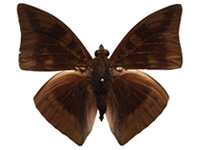
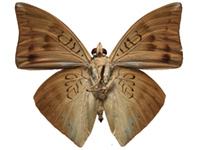
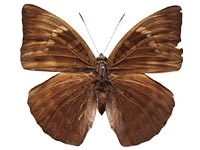
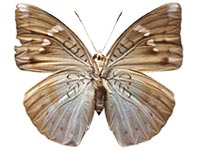
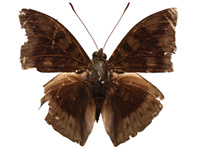
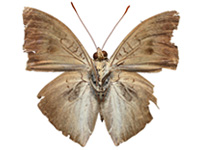
 |
 |
 |
 |
| ♂, Tak, Thailand. | ♀, 1994.03.16. Tak, Thailand. | ||
 |
 |
||
| ♂, Tak, Thailand. | |||
| ON :
Euthalia eriphylae Nicéville, 1891 OD : J. Bombay Nat. Hist. Soc. 6(3): 353-354, Pl.F, fig.7,♂. TL : "Tenasserim" [Tanintharyi Region, Myanmar]. (NZC) Distribution : C. to S.Myanmar, W.Thailand.
|
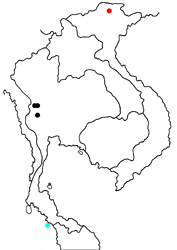 |
Type ♂, Tenasserim. (NZC) ; Sheela et al.,2019 : 208, figs.♂,♂(Un).
[ THAILAND ]
Euthalia eriphyle [sic] eriphyle [sic] ; Godfrey,1930 : 293. (Me Wong)
Euthalia eriphylae eriphylae ; Pinratana,1979 : 75, not fig. (Nakhon Sawan)
Euthalia eriphylae chula ; Ek-Amnuay,[2007] : pl.193, figs.N145a♂(left). (Umphang) (in part)
Euthalia eriphylae chula ; Ek-Amnuay,2012 : pl.197, fig.N311a♂(Umphang). (Umphang) (in part)
Euthalia mahadeva binghamii ; Ek-Amnuay,2012 : 450, pl.198, figs.N312a♀(Un). (Umphang) (in part)
Euthalia eriphylae chula ; Kimura et al.,2016 : 105, not fig. (Thun Yai [Thung Yai]) (in part)
[ THAILAND ]
Tak : 2♂ 1♀.
Umphang dist., 1♀, 1994.03.16. LC (YI).
| Jan | Feb | Mar | Apr | May | Jun | Jul | Aug | Sep | Oct | Nov | Dec |
The butterfly is rare in montane forest at moderate elevations (Alt. 800 - 1000m).
The classification of the three species, including eriphylae, mahadeva and merta, has been confusing from the past to the present.
The reason is the markings of each species are very similar, there is no difference in the male genitalia and they are all uncommon, making it difficult to collect specimens for comparison.
Nicéville (1891) described Euthalia eriphylae based on a single male from Tenasserim and the female was unknown.
Tytler (1940) described a specimen of dsf which seems to be the only female in the NHML.
The specimen was collected at Pattechaung [Patchichoung], S. Tenasserim in Mar.1926, but I have also examined this specimen (BMNH #985620) and it is definitely a female of Euthalia merta, not Euthalia eriphylae.
Other specimens identified as Euthalia eriphylae in the NHML include a female from Naga Hills (#985474), a male from Assam (#985647) and a male from [Assam?] (#985502), all of which are definitely Euthalia merta.
After Tytler, there is no information on the female of eriphylae.
D'Abrera (1983) showed a female of Euthalia eriphylae eriphylae,
However, as noted in the section on Euthalia mahadeva binghamii, it is a female of Euthalia mahadeva binghamii.
I believe that the specimen shown above is the true female of Euthalia eriphylae.
The species is very similar to the female of the continental Euthalia merta,
but can be distinguished by the V-shaped submarginal markings on the UpH, instead of the black dots of the female of Euthalia merta.
The white markings on the UpF are very similar to those of continental merta.
I suspect that taxa with these small, underdeveloped white spots on the UpF are Euthalia eriphylae, and that taxa with large white spots (for instance chula and lioneli) are Euthalia mahadeva.
The populations that I consider to be eriphylae occur very locally in the Malay Peninsula (ssp.elioti), Langkawi-Tarutao Islands (ssp.raja), W. Thailand to C. Myanmar (ssp.eriphylae), and N. Vietnam (undescribed ssp.).
The record of Euthalia eriphylae chula from Thun Yai [Thung Yai], Kanchanaburi is considered to be this taxon.
The species is rare or extremely rare in all regions and occurs sympatrically with Euthalia mahadeva.
The distribution map of eriphylae excludes some taxa such as chula and lioneli etc., which could be Euthalia mahadeva.
As for the eriphylae-mahadeva complex, further field research and DNA analysis are needed.
Nicéville, L. de,1891 : On new and little-known Butterflies from the Indo-Malayan region.
J. Bombay nat. Hist. Soc. 6(3): 341-398.
Moore, F.,1898 : Lepidoptera Indica. Rhopalocera. Family Nymphalidae. Sub-family Nymphalinae (continued), Groups Potamina, Euthalina, Limenitina Lepidoptera Indica 3.
(30): 113-128, pl.231-238 ; (31): 129-144, pl.239-246.
London, L.Reeve and Co.
Bingham, C.T.,1905 : The Fauna of British India, including Ceylon and Burma. Butterflies 1.
London. xxii + 511 pp, pls.1-10.
Tytler, H.,1940 : Notes on Some New and Interesting Butterflies chiefly from Burma. Part.2.
J. Bombay nat. Hist. Soc. 42: 109-123.
D'Abrera, B.,1985 : Butterflies of the Oriental Region Part 2. Nymphalidae, Satyridae & Amathusidae, Libytheidae and Acraeidae.
289 pp. Australia, Hill House.
|
2007.02.10 - 2021.09.30.
|